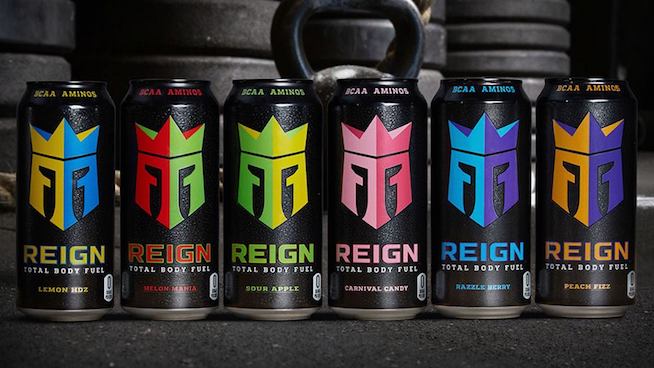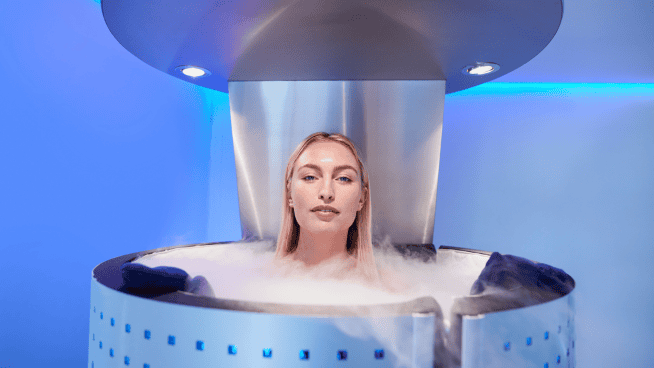Are Reign Energy Drinks Healthy?
Energy drinks are rarely healthy.
Thanks to massive amounts of caffeine and sugar, many aggressively stimulate the mind and body. But that soaring spike in energy is usually followed by a thunderous crash that leaves you feeling groggier and worse off than before. One of the hottest new energy drinks on the market? Reign Total Body Fuel.
Brought to market by Monster Beverage Corp, makers of the popular line of Monster energy drinks, Reign energy drinks are in many ways similar to Bang energy drinks. As we’ve previously detailed, Bang energy drinks may appear healthy at first glance, but they’re rarely a wise choice. But what’s the story for Reign? How do the nutrition facts measure up? Are Reign energy drinks healthy? Let’s find out.

At a glance, Reign energy drinks seem to possess many of the same benefits of Bang. They contain no calories, no fat and no sugar. That right there makes them seem like a massive improvement over something like a can of Rockstar, which packs 260 calories and 62 grams of sugar.
Regular consumption of beverages high in added sugar has been associated with an increased risk of cancer, heart disease and type 2 diabetes. The American Heart Association recommends a limit of 24 grams per day for women and 36 grams per day for men. Each gram of sugar also contains 4 calories, so high amounts of sugar can quickly send the calorie total skyrocketing (95% of the calories in the aforementioned 16-ounce can of Rockstar come from sugar, for example).
Consuming significant amounts of sugar quickly leads your blood sugar to spike and then drop in rapid fashion, which can lead to feelings of tiredness, lethargy and irritability. By cutting out the sugar, Reign cuts out the sugar crash inherent with many other energy drinks. But Reign still packs plenty of sweetness despite the lack of sugar. How? Let’s look at the ingredients included in a can of Melon Mania Reign:

Bingo—sucralose. Sucralose is the secret of how Reign energy drinks can taste so good despite containing zero grams of sugar. Sucralose is a common artificial sweetener that is 320 to 1,000 times sweeter than table sugar. Splenda is one common sucralose-based sweetener.
Healthline concludes that Sucralose “is probably fine to use in moderation” if your body handles it well, and it’s generally recognized as safe by the FDA. However, it may cause issues with your gut health, and like most artificial sweeteners, it probably won’t help you decrease your overall calorie consumption in the grand scheme of things.
When we consume something sweet, it signals to our body to expect incoming calories. When those calories don’t arrive, as is the case with zero-calorie diet sodas or energy drinks, we often end up consuming more calories elsewhere to make up for what’s “missing.” Are artificially-sweetened beverages less harmful than sugar-ladened ones? Probably, but the healthiest long-term approach is cutting down on sweeteners, both natural and artificial, all together.
RELATED: How Zero-Calorie Diet Soda Can Still Be Bad For You
There are 1,000mg of branched-chain amino acids, or BCAAs, contained in each can of Reign (one 16-ounce can contains two 8-ounce servings). The term refers to three amino acids: leucine, isoleucine and valine. These three are all essential amino acids, meaning they cannot be made by the human body. While BCAAs are one of the most popular types of supplements out there, they’re largely superfluous for most people. If you’re eating the right way and consuming between 1.0-1.5 grams of protein per kilogram of bodyweight per day, you should be all set.
“If you’re eating an overall healthy diet and you’re balancing your protein throughout the day, you really don’t need to take BCAAs in supplement form,” says Joy Dubost, RD and a spokesperson for the American Dietetic Association. In fact, excessive BCAA consumption may have negative consequences.
The marketing for Reign also touts the drink’s significant electrolyte content. Electrolytes such as sodium, potassium, calcium and magnesium help the body retain fluid and enhance fluid and nutrient absorption. However, unless you’re working out intensely for over an hour, competing in a tournament where you have back-to-back games or events, or training in extreme heat, odds are you’re getting plenty of electrolytes elsewhere. And if you do need extra electrolytes via fluids, relying on an energy drink to get them in such situations is usually not the best idea.
It’s a similar story with the drink’s hefty dose of B vitamins—it might look good on the packaging, but if you’re eating a balanced diet, you’re probably already getting all the B vitamins you need. Healthline states that “most people get the recommended amounts of these vitamins through diet alone since they are found in a wide variety of foods.” Vegetarians are one population that can have trouble getting sufficient amounts of B vitamins, however.
Coenzyme Q10, or CoQ10, is another ingredient that appears in Reign. According to the Mayo Clinic, CoQ10 is “an antioxidant that your body produces naturally. Your cells use CoQ10 for growth and maintenance.” Supplementing with it could help boost physical performance, as CoQ10 is involved in energy production, but research on the topic has produced mixed results. The Mayo Clinic does consider CoQ10 supplements to be “generally safe.”
But those ingredients are not the reason most people pick up a can of Reign Total Body Fuel. In reality, it’s all about the caffeine. One 16-ounce can contains a staggering 300mg of caffeine. The average 8-ounce cup of brewed coffee contains 95mg, while a 12-ounce can of Red Bull contains 111mg. Any way you look at it, that’s an extraordinary amount of caffeine in a single serving. But is it too much?
A recent review published in the journal Food and Chemical Toxicology looked at 700 studies to determine what qualifies as “safe” caffeine consumption levels. Their findings indicated the following amounts of daily caffeine consumption to be safe as they’re not associated with “overt, adverse effects”:
- 400mg for healthy adults
- 300mg for pregnant women
- 2.5mg per kg of bodyweight for children and adolescents
Although it’s impossible to know exactly how everyone will react to caffeine, a limit of 400mg per day is generally considered safe for the overwhelming majority of healthy people. But those words per day are crucial. Chugging a can of Reign allows you to down 300mg of caffeine in mere minutes, which can be too much, too fast for people who are not accustomed to such a dose. A Twitter search for the term “Reign energy drink” unveils several such instances.
But that haymaker of caffeine is the same reason many gym rats love the stuff. Caffeine can be an extremely attractive substance for those who engage in intense physical activity. Research has found that moderate amounts of caffeine can help you delay exhaustion, burn more fat, reduce exercise-related pain and help better restore muscle glycogen levels. A 2016 review published in the journal Neuroscience & Biobehavioral Reviews found that doses of caffeine over 200 mg were “ergogenic across a spectrum of exercise modalities” in the examined studies. Ergogenic is defined as “enhancing physical performance.”
So a significant dose of caffeine, provided you tolerate it well, can certainly provide a serious boost during many types of physical activity. However, the major amounts of caffeine are a big reason for the numerous warnings you’ll find on each can of Reign. Each one is slapped with a big “Recommend for Persons 18 Years or Older” label. The can also warns that the beverage is not recommended for people sensitive to caffeine, pregnant women, or women who are nursing, and that it’s intended for “healthy adults only.” Additionally, it recommends consulting a healthcare professional before drinking Reign if you’re taking any medication or have any preexisting medical conditions.
So, are Reign Total Body Fuel energy drinks healthy? Well, no. Water is healthy. Unsweetened tea is healthy. But super-caffeinated, ultra-processed energy drinks high in artificial sweeteners—even if they are low in calories? Eh, not so much. After a 2017 review on energy drinks led by researchers from the Harvard T.H. Chan School of Public Health, the authors concluded “the health risks associated with energy drinks outweigh any short-term pep they may provide.”
You could certainly do much worse than Reign if you’re going to reach for an energy drink, but for most people, a large coffee can also provide a sugar-free boost of caffeine but in an overall package that’s both healthier and safer.
Photo Credit: @ReignBodyFuel on Facebook
READ MORE:
RECOMMENDED FOR YOU
MOST POPULAR
Are Reign Energy Drinks Healthy?
Energy drinks are rarely healthy.
Thanks to massive amounts of caffeine and sugar, many aggressively stimulate the mind and body. But that soaring spike in energy is usually followed by a thunderous crash that leaves you feeling groggier and worse off than before. One of the hottest new energy drinks on the market? Reign Total Body Fuel.
Brought to market by Monster Beverage Corp, makers of the popular line of Monster energy drinks, Reign energy drinks are in many ways similar to Bang energy drinks. As we’ve previously detailed, Bang energy drinks may appear healthy at first glance, but they’re rarely a wise choice. But what’s the story for Reign? How do the nutrition facts measure up? Are Reign energy drinks healthy? Let’s find out.

At a glance, Reign energy drinks seem to possess many of the same benefits of Bang. They contain no calories, no fat and no sugar. That right there makes them seem like a massive improvement over something like a can of Rockstar, which packs 260 calories and 62 grams of sugar.
Regular consumption of beverages high in added sugar has been associated with an increased risk of cancer, heart disease and type 2 diabetes. The American Heart Association recommends a limit of 24 grams per day for women and 36 grams per day for men. Each gram of sugar also contains 4 calories, so high amounts of sugar can quickly send the calorie total skyrocketing (95% of the calories in the aforementioned 16-ounce can of Rockstar come from sugar, for example).
Consuming significant amounts of sugar quickly leads your blood sugar to spike and then drop in rapid fashion, which can lead to feelings of tiredness, lethargy and irritability. By cutting out the sugar, Reign cuts out the sugar crash inherent with many other energy drinks. But Reign still packs plenty of sweetness despite the lack of sugar. How? Let’s look at the ingredients included in a can of Melon Mania Reign:

Bingo—sucralose. Sucralose is the secret of how Reign energy drinks can taste so good despite containing zero grams of sugar. Sucralose is a common artificial sweetener that is 320 to 1,000 times sweeter than table sugar. Splenda is one common sucralose-based sweetener.
Healthline concludes that Sucralose “is probably fine to use in moderation” if your body handles it well, and it’s generally recognized as safe by the FDA. However, it may cause issues with your gut health, and like most artificial sweeteners, it probably won’t help you decrease your overall calorie consumption in the grand scheme of things.
When we consume something sweet, it signals to our body to expect incoming calories. When those calories don’t arrive, as is the case with zero-calorie diet sodas or energy drinks, we often end up consuming more calories elsewhere to make up for what’s “missing.” Are artificially-sweetened beverages less harmful than sugar-ladened ones? Probably, but the healthiest long-term approach is cutting down on sweeteners, both natural and artificial, all together.
RELATED: How Zero-Calorie Diet Soda Can Still Be Bad For You
There are 1,000mg of branched-chain amino acids, or BCAAs, contained in each can of Reign (one 16-ounce can contains two 8-ounce servings). The term refers to three amino acids: leucine, isoleucine and valine. These three are all essential amino acids, meaning they cannot be made by the human body. While BCAAs are one of the most popular types of supplements out there, they’re largely superfluous for most people. If you’re eating the right way and consuming between 1.0-1.5 grams of protein per kilogram of bodyweight per day, you should be all set.
“If you’re eating an overall healthy diet and you’re balancing your protein throughout the day, you really don’t need to take BCAAs in supplement form,” says Joy Dubost, RD and a spokesperson for the American Dietetic Association. In fact, excessive BCAA consumption may have negative consequences.
The marketing for Reign also touts the drink’s significant electrolyte content. Electrolytes such as sodium, potassium, calcium and magnesium help the body retain fluid and enhance fluid and nutrient absorption. However, unless you’re working out intensely for over an hour, competing in a tournament where you have back-to-back games or events, or training in extreme heat, odds are you’re getting plenty of electrolytes elsewhere. And if you do need extra electrolytes via fluids, relying on an energy drink to get them in such situations is usually not the best idea.
It’s a similar story with the drink’s hefty dose of B vitamins—it might look good on the packaging, but if you’re eating a balanced diet, you’re probably already getting all the B vitamins you need. Healthline states that “most people get the recommended amounts of these vitamins through diet alone since they are found in a wide variety of foods.” Vegetarians are one population that can have trouble getting sufficient amounts of B vitamins, however.
Coenzyme Q10, or CoQ10, is another ingredient that appears in Reign. According to the Mayo Clinic, CoQ10 is “an antioxidant that your body produces naturally. Your cells use CoQ10 for growth and maintenance.” Supplementing with it could help boost physical performance, as CoQ10 is involved in energy production, but research on the topic has produced mixed results. The Mayo Clinic does consider CoQ10 supplements to be “generally safe.”
But those ingredients are not the reason most people pick up a can of Reign Total Body Fuel. In reality, it’s all about the caffeine. One 16-ounce can contains a staggering 300mg of caffeine. The average 8-ounce cup of brewed coffee contains 95mg, while a 12-ounce can of Red Bull contains 111mg. Any way you look at it, that’s an extraordinary amount of caffeine in a single serving. But is it too much?
A recent review published in the journal Food and Chemical Toxicology looked at 700 studies to determine what qualifies as “safe” caffeine consumption levels. Their findings indicated the following amounts of daily caffeine consumption to be safe as they’re not associated with “overt, adverse effects”:
- 400mg for healthy adults
- 300mg for pregnant women
- 2.5mg per kg of bodyweight for children and adolescents
Although it’s impossible to know exactly how everyone will react to caffeine, a limit of 400mg per day is generally considered safe for the overwhelming majority of healthy people. But those words per day are crucial. Chugging a can of Reign allows you to down 300mg of caffeine in mere minutes, which can be too much, too fast for people who are not accustomed to such a dose. A Twitter search for the term “Reign energy drink” unveils several such instances.
But that haymaker of caffeine is the same reason many gym rats love the stuff. Caffeine can be an extremely attractive substance for those who engage in intense physical activity. Research has found that moderate amounts of caffeine can help you delay exhaustion, burn more fat, reduce exercise-related pain and help better restore muscle glycogen levels. A 2016 review published in the journal Neuroscience & Biobehavioral Reviews found that doses of caffeine over 200 mg were “ergogenic across a spectrum of exercise modalities” in the examined studies. Ergogenic is defined as “enhancing physical performance.”
So a significant dose of caffeine, provided you tolerate it well, can certainly provide a serious boost during many types of physical activity. However, the major amounts of caffeine are a big reason for the numerous warnings you’ll find on each can of Reign. Each one is slapped with a big “Recommend for Persons 18 Years or Older” label. The can also warns that the beverage is not recommended for people sensitive to caffeine, pregnant women, or women who are nursing, and that it’s intended for “healthy adults only.” Additionally, it recommends consulting a healthcare professional before drinking Reign if you’re taking any medication or have any preexisting medical conditions.
So, are Reign Total Body Fuel energy drinks healthy? Well, no. Water is healthy. Unsweetened tea is healthy. But super-caffeinated, ultra-processed energy drinks high in artificial sweeteners—even if they are low in calories? Eh, not so much. After a 2017 review on energy drinks led by researchers from the Harvard T.H. Chan School of Public Health, the authors concluded “the health risks associated with energy drinks outweigh any short-term pep they may provide.”
You could certainly do much worse than Reign if you’re going to reach for an energy drink, but for most people, a large coffee can also provide a sugar-free boost of caffeine but in an overall package that’s both healthier and safer.
Photo Credit: @ReignBodyFuel on Facebook
READ MORE:










